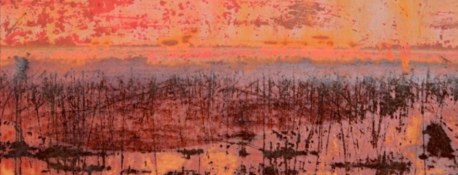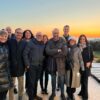 Yesterday, at one my favorite local tea shops, I walked into the art show of friend and artist, Tim Davis. Tim has a gift for taking unique pictures of old worn out vehicles, turning a rust spot on a truck into Japanese calligraphy, a burned piece of metal into the rising sun and flaking tractor paint into a haunting skyline. (Really, you must see his work!) His talent for showing a fresh perspective and beauty in the everyday reminded me of a blog I wrote a few years ago, which I share with you again here.
Yesterday, at one my favorite local tea shops, I walked into the art show of friend and artist, Tim Davis. Tim has a gift for taking unique pictures of old worn out vehicles, turning a rust spot on a truck into Japanese calligraphy, a burned piece of metal into the rising sun and flaking tractor paint into a haunting skyline. (Really, you must see his work!) His talent for showing a fresh perspective and beauty in the everyday reminded me of a blog I wrote a few years ago, which I share with you again here.
ORIGINAL BLOG – Remember the day you drove home on the same boring route, yet noticed— for the very first time— how the sun hangs like an exquisite saffron-colored ball in the sky right before it sets?
Or the time you waved hello to a client while secretly wondering, “Wow, she looks different: leaner, healthier somehow … new hair color? Updated suit?” only to learn she’d achieved her weight loss goal (50 pounds) right before your eyes?
In both cases you experienced what George Carlin coined as “vuja de,” that funny feeling when something that should be very familiar seems totally new. I discovered the alarming side of vuja de as an eight-year-old. After many recitals and hundreds of hours practicing till my backside went numb, I sat down to perform Beethoven’s “Fur Elise” for a music contest. The keys of that gleaming black grand piano awaited me and… nothing. Not one single note came to my fingers. You might say it was a disconcerting moment (pardon the pun).
Fingering a different kind of keyboard today, I ponder the other times I’ve experienced this phenomenon and realize most of them, while always disconcerting, have actually resulted in a pleasant refreshing of my perspective. It’s a chance to step out of everyday assumptions to see old things anew. So I wonder: rather than waiting for these moments to descend on me out of the blue, what if I could create vuja de?
What would it mean to see routine things—our patterns for living, working and leading—with fresh eyes? It would add to our ability to uncover new solutions that have been waiting just under our noses. Or just under our tires, in plain old pavement where vuja-de inspired researchers may be developing a new way to generate energy… from the heat absorbed by parking lots. Leaders who cultivate this sort of perspective can transform just about anything mundane—tired products, stale service lines, lackluster relationships—into something innovative.
Here are four very different exercises I’ve found that can refresh my outlook on just about anything that’s gone stagnant or humdrum in my life and work:
- For your next routine meeting, imagine yourself as a first-day intern. Set aside your assumptions, beliefs, and preconceived ideas (all those fruits of your hard-earned experience) and walk in as if for the first time. Notice all the things you see and hear: this is what Zen Buddhists call “beginner’s mind.” When you bring this sort of curiosity to a meeting, you remain open to what naturally emerges from the group.
- When facing your next major challenge, use what some Native Americans call the Rule of Seven. Tell at least seven stories about your challenge, each one from a unique vantage point: your view plus that of a colleague, a competitor, and so forth. When you observe a challenge in this kind of 3600 manner, you often find multiple solutions, allowing you to choose the best fit.
- Ask someone with very different beliefs about their stance on a sticky issue. I recommend picking an issue close to your heart, such as a political, humanitarian, or spiritual matter. Your sole job in this exercise is to listen to their point of view without judgment. One imaginative thinker has made this an institution, called “the Living Library,” in 12 countries and counting. Rather than checking out books, people check out people for a 30 minute conversation to purposefully challenge their own prejudices.
- Explore an unfamiliar industry or company that seems totally unrelated to your own. Healthcare company Kaiser Permanente did this very exercise for a team charged with medication administration: they visited car dealers, grocers, flight schools, and a forensic science expert, making connections to their own workplace challenges, and ultimately discovering new ideas to reduce errors with medication.
Vuja de may not have won me that piano contest back when I was eight, but for leaders it can mean the difference between rehearsing familiar tunes and creating a whole new composition.
Photo © Tim Davis – used with permission





